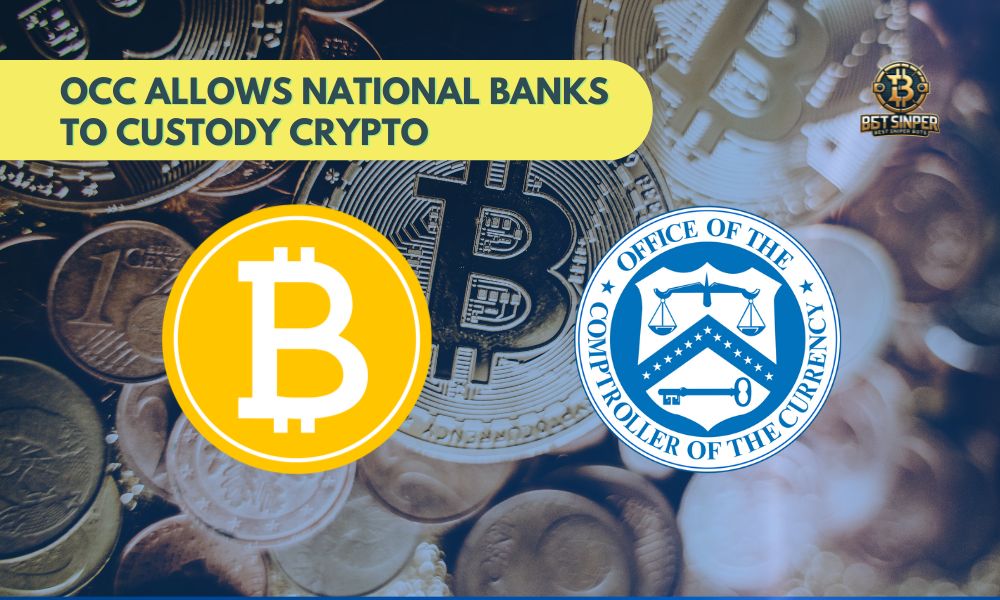On March 8, 2025, the Office of the Comptroller of the Currency (OCC) made a groundbreaking announcement that has sent ripples through the financial world. The OCC now permits national banks and federal savings associations to custody crypto assets without prior regulatory approval. This move, dubbed a turning point for cryptocurrency adoption, raises a key question: how will this reshape banking and digital assets? Dive in as we explore how the OCC allows national banks to custody crypto and its implications.

Contents
What the OCC’s decision means
The OCC, the federal agency overseeing national banks, has greenlit a range of crypto-related activities, marking a significant shift in the financial sector. Banks can now safeguard cryptographic keys for customers, manage stablecoin operations, and even run blockchain nodes. These activities no longer require pre-approval as long as proper risk management measures are in place.
By allowing national banks to custody crypto assets, the OCC is paving the way for greater institutional adoption of digital currencies. This decision provides banks with new opportunities to offer secure and regulated crypto services, potentially increasing trust in the market. It also encourages traditional financial institutions to integrate blockchain technology, bridging the gap between traditional banking and the evolving digital asset ecosystem.
With this regulatory clarity, banks may now explore partnerships with crypto firms, develop new financial products, and provide more robust security for digital asset holders. The OCC’s move signals a major step toward mainstream acceptance of cryptocurrencies, setting a precedent for future regulations.
Policy backdrop and Trump’s influence
This ruling didn’t emerge in isolation. On March 6, 2025, President Donald Trump signed an executive order establishing a strategic Bitcoin reserve and a national digital asset stockpile, a landmark move signaling strong government support for cryptocurrency. David Sacks, the White House’s “Crypto Czar,” emphasized Bitcoin’s scarcity as a crucial long-term asset for the U.S. economy, likening it to digital gold. The administration’s pro-crypto stance has encouraged regulators to take steps that integrate digital assets into the traditional financial system.
With the OCC’s latest move, national banks now have the regulatory green light to align with this broader vision. By allowing them to custody crypto, the OCC ensures that banks can participate in the evolving digital economy without unnecessary red tape. This decision aligns with the government’s strategy to position the U.S. as a leader in blockchain innovation and financial technology. It also reflects a growing recognition that cryptocurrencies are here to stay and can play a significant role in national economic strategy.
As banks explore their role in digital asset custody, the implications stretch beyond the financial sector. This decision could shape future regulations, influence international policies on digital assets, and redefine how cryptocurrencies interact with traditional finance. The OCC allows national banks to custody crypto, reinforcing a top-down endorsement of digital assets and setting a precedent for further institutional adoption.
Impact on banks and the crypto market
The OCC’s ruling opens doors for banking giants like JPMorgan Chase, Bank of America, and Citigroup to enter the crypto custody space with confidence. Traditional banks have long been hesitant due to unclear regulations, but this decision removes a key barrier, allowing them to offer secure digital asset services to their clients. The timing is particularly crucial as institutions seek new revenue streams, and crypto custody could become a lucrative business. Banks now have a clear path to integrate crypto into their offerings, from wealth management to institutional custody services.
Adding further momentum, the SEC’s recent repeal of SAB 121 eliminates a major accounting hurdle. Previously, banks had to treat custodial crypto assets as liabilities on their balance sheets, deterring them from entering the space. With this restriction lifted, financial institutions can more easily integrate crypto services without facing undue financial burdens. As a result, many analysts expect a surge in institutional adoption, further legitimizing Bitcoin and other digital assets in the eyes of traditional finance.
On social media, crypto enthusiasts are celebrating, calling this “open season” for Wall Street’s entry into the digital asset market. Some predict that this decision could drive Bitcoin prices higher as institutional demand surges. The OCC allows national banks to custody crypto, signaling a new phase of mainstream acceptance that could transform the crypto landscape. With traditional finance embracing digital assets, the industry may see unprecedented growth and stability.
Benefits and challenges ahead
For banks, this ruling offers more than just regulatory clarity – it’s a major opportunity to expand financial services. With crypto custody now permitted, banks can provide secure storage, facilitate stablecoin payments, and integrate blockchain into their operations. These advancements could enhance cross-border transactions, strengthen financial security, and make crypto more accessible to the public.
However, challenges persist. Crypto’s volatility remains a concern, and banks must implement strong cybersecurity measures to prevent hacks and fraud. Compliance with AML and KYC regulations will also be crucial to maintaining transparency and legality in crypto-related banking activities.
Ultimately, while the OCC allows national banks to custody crypto, success hinges on balancing innovation with stability. Banks that effectively manage risks and leverage blockchain’s potential could lead the way in creating a more secure, regulated crypto ecosystem, accelerating mainstream adoption in traditional finance.
The OCC’s decision marks a pivotal moment for cryptocurrency in the U.S. financial system. By allowing national banks to custody crypto, the OCC has paved the way for deeper integration of digital assets into everyday banking. As the market evolves, staying informed is key. Visit Best Sniper Bots for the latest updates and tools to capitalize on this shift. The OCC allows national banks to custody crypto – don’t miss out on the revolution!
